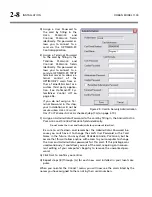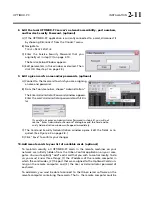
2-16
INSTALLATION
ORBAN MODEL 1100
Audio Input and Output Connections
Cable
We recommend using two-conductor foil-shielded cable (such as Belden
8451/1503A/1504A/1508A or equivalent for analog signals and Belden 1800B/1801B
or equivalent for digital signals), because signal current flows through the two con-
ductors only. The shield does not carry signal, and is used only for shielding.
Connectors
The cable assemblies are optional and must be purchased separately from
OPTIMOD-PC. If you order the model 1100/CBLXLR assembly, input and output con-
nectors are XLR. If you order OPTIMOD-PC/CBLRCA assembly, input and output con-
nectors are RCA. If you order OPTIMOD-PC/CBL assembly, the cables are terminated
in bare wires so you can terminate them with the connectors of your choice.
In the XLR-type connectors, pin 1 is CHASSIS GROUND, while pin 2 and
pin 3 are a balanced, floating pair. This wiring scheme is compatible with
any studio-wiring standard: If one pin is considered LOW, the other pin is
automatically HIGH. However, we arbitrarily call pin 2 HIGH and pin 3
LOW to conform to AES standards.
In the RCA-type connectors, the center pin (called “T” [for “tip”] in the
diagram) is HIGH, while the outer sleeve (called “S” in the diagram) is
LOW and SHIELD.
See
Figure 2-2: Wiring Diagram for the OPTIMOD-PC XLR
and
Figure 2-3:
Wiring Diagram for the OPTIMOD-PC RCA Cable Assembly
on page 2-5.
Analog Audio Input
Using Orban’s mixer application (available from the
T
OOLS
menu on the Orban Con-
trol application or from your computer’s control panel in Multimedia), you can
choose a nominal input level of either –10dBV (IHF consumer level) or +4dBu (pro-
fessional level).
(0dBu = 0.775Vrms. For this application, the dBm@600
Ω
scale on voltme-
ters can be read as if it were calibrated in dBu. 0dBV = 1.0Vrms.)
The peak input level that causes overload depends on whether you have set the in-
put for –10 dBV (–7.8 dBu) or +4dBu. Overload occurs at approxi9.2 dBV
(+11.4 dBu) for the –10 dBV setting and +20 dBu for the +4 dBu setting.
The electronically balanced input uses an ultra low noise and distortion differential
amplifier for best common mode rejection
.
It is compatible with most professional
and semi-professional audio equipment, balanced or unbalanced, having a source
impedance of 600
Ω
or less. The input is EMI suppressed.
•
Input connections are the same whether the driving source is balanced or unbal-
anced.
















































